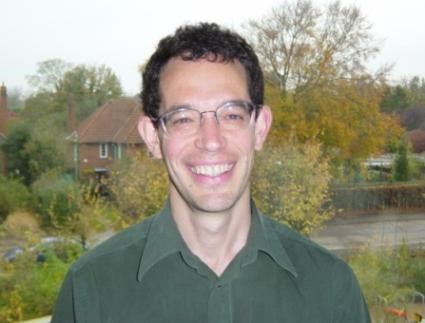 |
| Neil Turok |
Neil Turok believes that science, like the universe, is boundless and beautiful.
Although he is, in many ways, consumed by his research and theories on the universe and its inception, he is well aware that here on earth also lies boundless opportunities within untapped scholarly minds.
Likewise, although busy as the Chair of Mathematical Physics at Cambridge University and passionately studying the birth of our universe, he also founded the African Institute for Mathematical Sciences in Muizenberg (a coastal suburb of Cape Town) in 2003, as “a postgraduate educational centre supporting the development of mathematics and science across the African continent.”
This is not entirely surprising given his passion for mathematical physics and his own personal history. He, himself, was born in Johannesburg, South Africa in 1958. His parents, Mary and Ben Turok, were prominent activists in the anti-apartheid movement and the African National Congress and accordingly, instilled in him the belief that all minds are created equal – although some are allowed different educational opportunities along the way.
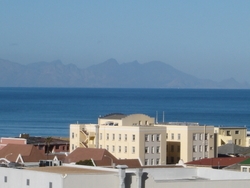 |
| The African Institute for Mathematical Sciences (AIMS) |
The premise for The African Institute for Mathematical Sciences (AIMS) is simple: promote mathematics and science in Africa.
The reality of it: revolutionary.
Fritz Hahne, director of AIMS says (in an interview with Nature Materials) that what sets the institute apart is a focus on excellence geared specifically at the needs of Africa. Whereas most African learning institutions continue to decline or face neglect, AIMS serves as a premier learning institution with modern facilities and top-notch faculty that are helping connect Africa to a global scientific community.
Likewise, in order to promote the best and brightest and bring African intellectualism to a global scale, one of the main goals of the institute is to recruit and train talented students and teachers. So far, they have clearly succeeded in this endeavor. Since its inception, 160 exceptional students selected from all over Africa have successfully completed the course. The decision process is rigorous, with selections made from amongst the very best students in the whole of Africa.
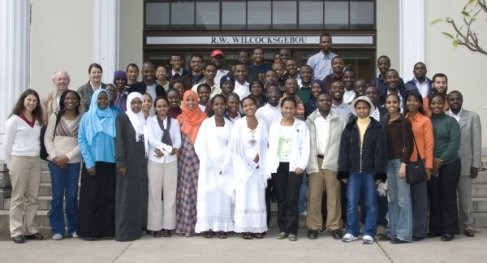 |
| AIMS students 2007 |
For the 2007-2008 school year, 52 students have been selected from 20 African nations, with more than a third of them female. This fact alone brings incredible promise to the future of Africa. Promoting science and math in Africa is one thing – creating female scientists and mathematicians in a continent often riddled with human rights injustices, particularly against women, takes Turok’s vision to a whole other level.
The institute offers a nine-month postgraduate course of study that covers cutting edge science and culminates with a diploma in Mathematical Sciences. Students are often offered scholarships and as a whole, the institution is run by grants, partial government funding, and donations.
As in universities of medieval times, students and professors live under one roof, forging a tight academic community bound by a love for science.
Turok feels that the “brain drain” from Africa (intellectuals, particularly PhDs, leaving and working abroad) is a staggering problem for the continent and likewise, AIMS strives to encourage a commitment to Africa by retaining a strong African student body within a very African environment, with teachers from both Africa and abroad. Courses are intended to help students identify fields within Africa that can provide them with career security while simultaneously giving them a competitive advantage internationally, within their particular field of study. One such example is the analysis and epidemiological modeling of HIV/AIDS which remains an especially consuming problem in Africa. Research centers are beginning to sprout up in Africa, including one right across the street from AIMS, and it is the hope of AIMS, Turok, and other involved in the endeavor, that they will form the basis for mathematical sciences in Africa.
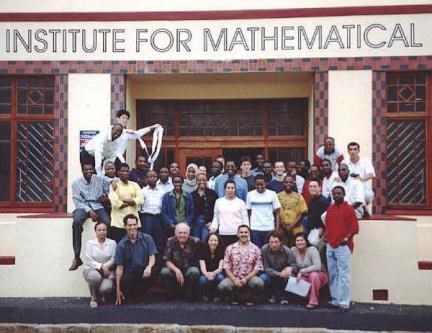 |
| AIMS group of students and faculty, 2003 |
Turok’s own love for mathematical science is what keeps him endlessly passionate about the institute and his own work. Prior to coming to Cambridge, he was an award-winning scientist of theoretical physics and a professor at Princeton University. He has worked in cosmology, mathematical physics, and early-universe physics.
So what exactly is physics, and how is it that Turok is using it to creating theories on the universe?
Physics is the study of the laws of nature that govern how the universe behaves. This includes everything from studying tiny, sub-atomic particles to cosmology, the large-scale study of the universe as a whole. These laws are then used to create theories, and solutions for practical problems. Mixing mathematics, critical thinking, and problem-solving, mathematical physics works to solve problems inspired by physics using rigorous mathematics.
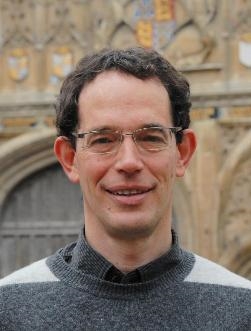 |
| Turok,from his homepage |
Turok has worked with other brilliant minds in attempts to answer the ever-present question: ‘how did the universe begin?’ Or as Turok prefers to ask: ‘did it “begin” at all?” His work with Stephen Hawking developed what is known as the ‘ Hawking-Turok instanton solutions’ on the birth of the universe. Currently he is working with Paul Steinhardt at Princeton on a ‘cyclic model’ for the universe, explaining the ‘big bang’ as a collision between two ‘brane worlds.’
Turok’s work in mathematical physics and with the African Institute for Mathematical Sciences have garnered him well-deserved international attention. Most recently he was awarded the 2008 TED Prize for his work. In addition to the monetary prize he will receive, ideally, the international acclaim will prompt even greater focus on science and math in Africa, appealing to both scholars within Africa, as well as to diaspora that perhaps will choose to return and partake in a growing scientific community, in addition to lecturers and professors which might be interesting in sharing their own scientific knowledge with the African continent.
Africa and its eager scholars await them with open arms, yearning minds, and endless possibility.
Page created on 8/16/2014 6:57:30 PM
Last edited 1/9/2017 11:01:13 PM
